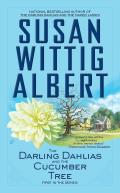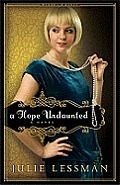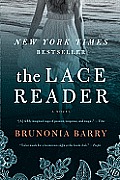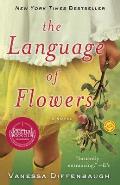 The Darling Dahlias and the Cucumber Tree
The Darling Dahlias and the Cucumber Tree by Susan Wittig Albert
Crime-solving highjinks set against the backdrop of Depression-era south.
The first in a series of cozy mysteries set in the early 1930s. The sleuths are members of Darling, Alabama's garden club. The Darling Dahlias and the Cucumber Tree features murder, bank fraud, a prison break, a haunting, twelve garden club ladies, and two cucumber trees. That's quite a bit to pack into one novel, but Albert juggles everything admirably. I enjoyed The Darling Dahlias and the Cucumber Tree and would be interested in continuing on with the series.
 A Hope Undaunted by Julie Lessman
A Hope Undaunted by Julie Lessman
Never judge a book by its cover.
If I had realized that A Hope Undaunted was an inspirational romance (i.e. Christian romantic fiction) I would not have checked it out. I did read it the entire novel because I needed to find out whether the feisty young women's rights advocate would be convinced of the importance of unquestioningly obeying her father and (future) husband. I found it overbearing.
 The Lace Reader by Brunonia Barry
The Lace Reader by Brunonia Barry
Self-published novel turned NY Times bestseller.
Set primarily in Salem, Massachusetts, and its environs, The Lace Reader examines Salem's legacy in an interesting way at a time when witchcraft good PR not a crime. Its unreliable narrator is a professed liar, but it is unclear just how much of her story is fiction for the majority of the novel. Compelling reading.
 The Language of Flowers by Vanessa Diffenbaugh
The Language of Flowers by Vanessa Diffenbaugh
A contemporary fictional meditation on the Victorian language of flowers.
I've been intrigued with the language of flowers since I first learned about it years ago. The problem with floriography is that the meanings of the flowers vary from source to source and the sentiments attributed to a particular bloom can be contradictory. One of the things that I liked most about Diffenbaugh's novel, The Language of Flowers, was the author's inclusion as an addendum of the floriography dictionary developed by her protagonist (and another character) during the course of the novel. The novel itself wasn't quite what I expected it (oh how the protagonist drove me to distraction at times with her inability to trust), but I appreciated it nonetheless.

So, was the feisty women's rights advocate convinced of the need to politely obey the men-folk?
ReplyDeleteThe Lace Reader looks interesting. For some reason I find books with unreliable narrators really compelling.
You used to be able to spot Christian fiction a mile off but they do seem to be changing tack recently. I avoid them like the plague, I don't want to be preached at in my reading.
ReplyDeleteCharlie - Of course she was. blerg.
ReplyDeleteAlso, I have a book recommendation for you. I just finished reading _Mrs. Robinson's Disgrace_ by Kate Summerscale. Diary as a literary form and legal history. I think this one might be very much up your alley.
Ellie - I feel exactly the same way about being preached at while reading. I don't mind at all characters whose actions and decisions are informed by their faith, but I despise when an author takes every opportunity to beat her readers over the head with the Bible. I had even less patience with this book that usual because the characters were supposed to be Irish catholics (set in Boston), but they were written as evangelicals with only the passing mention of the word priest.
I'll have to check it out! I just picked up a copy of Dicken's "Bleak House" for its extended representation of/commentary on the Court of Chancery, but I suspect it's going to take me a while to get through it, unless I have one of those "I must finish this book NOW!" moments of inspiration. The problem is, those usually happen at a point midway through the book, well after the "why am I still reading this?" moment.
ReplyDelete